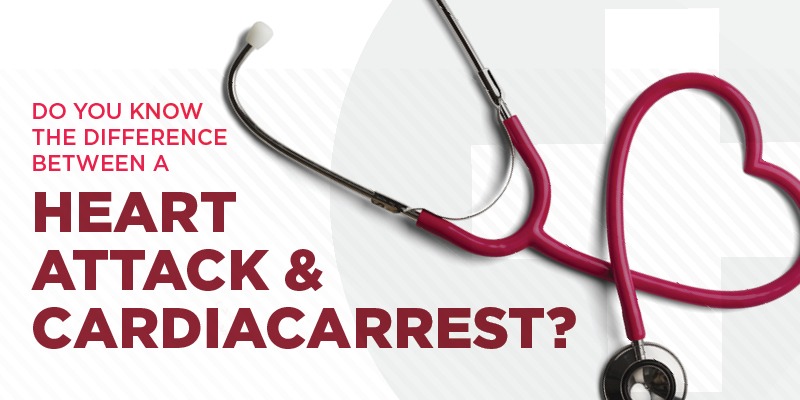October is Cardiac Arrest Awareness Month. Did you know that sudden cardiac arrest (SCA) and a heart attack are not the same things? Because the cause of sudden cardiac arrest is different, it should be treated differently. In both instances, fast action can help save lives so it’s important to recognize the symptoms and take the proper action.
What is a heart attack?
A heart attack is a blockage of an artery that prevents blood flow to a part of the heart muscle, causing that part of the heart to begin to die from lack of oxygenated blood. Heart attack symptoms can be sudden, but often they start hours or even days before the event. Warning signs of a heart attack include:

What is cardiac arrest?
Sudden cardiac arrest is due to an electrical malfunction in the heart that causes an irregular heartbeat or the heart to stop beating altogether. Without the heart pumping blood to the brain, lungs, and body, people quickly lose consciousness and can die within minutes. It often occurs with no warning. Symptoms are immediate and include:

What causes sudden cardiac arrest?
Cardiac arrest is caused by a disruption to the electrical impulses in your heart that cause it to beat irregularly (arrhythmia). Cardiac arrest can sometimes follow a heart attack. Some other reasons for the condition include:
- Inherited disorders – genetic arrhythmias can be passed from generation to generation
- Structural heart problems or changes – enlargement of the heart, heart disease, or other structural issues
- Ischemic heart disease – previous heart attacks can place you at a higher risk for SCA because of the damage heart attacks cause to the heart
- Physical stress – extreme physical stress, caused by intense activity, extremely low mineral levels, major blood loss, or lack of oxygen, can cause SCA
What to do in the event of sudden cardiac arrest?
If you suspect that someone is experiencing sudden cardiac arrest, immediate action should be taken.

- Appoint someone to call 9-1-1 immediately.
- Determine if there is an Automated External Defibrillator available at your location. AEDs were created for untrained bystanders and are often available in public locations. They are programmed to detect dangerous arrhythmias and give an electric shock to correct the issue if they do (they don’t provide an electric shock to someone who may be unconscious for another reason).
- Administer CPR until either an AED can be found, or emergency medical personnel arrive that can provide defibrillation. Remember that without the heart beating properly, there is no blood moving to the brain or lungs. Push hard and fast on the chest at 100 – 120 compressions per minute. Deliver rescue breaths only if you have been trained in CPR, otherwise only provide the compressions. Continue until an AED or EMTs arrive.
Understanding the difference between heart attack and SCA, and the underlying causes, will help you to know the appropriate actions to take. Recognition and immediate action in the case of sudden cardiac arrest can save lives.


Back to Blog